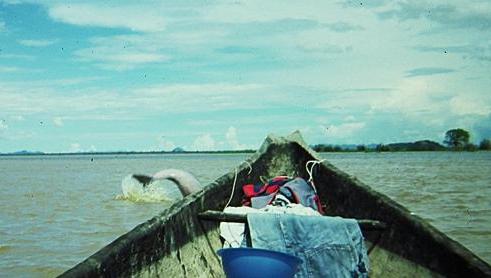A day on the river — with pictures!
This story has recently appeared on BootsNall, but I have now unearthed the original slides from the loft and it works much better with pictures!
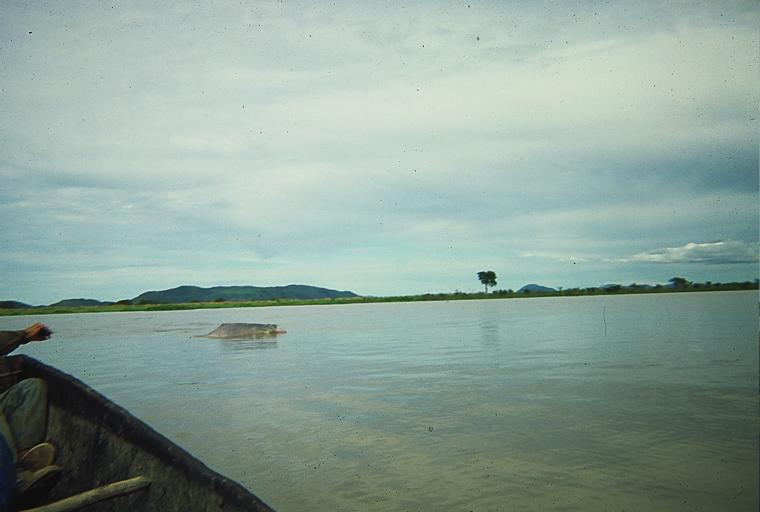
What do I remember about San Fernando de Apure?
Ants.
“Capybara con aroz”, the world’s largest rodent on the menu.
Piranhas that eat cigarettes.
Giant waterbugs, the size of my hand. The world’s biggest insects. They were swarming under the streetlights, expiring flapping on the pavement.
The best paella I have ever tasted. The first paella I have ever tasted.
The world’s finest rum.
San Fernando de Apure, in central Venezuela, was our haven between trips down the Apure and across the Orinoco looking for river dolphins (Inia geoffrensis). While we were waiting to arrange for a dug-out to take on a longer trip, we paddled around the local tributaries in a small aluminium canoe, pulling up on banks or drifting slowly down the current; studying the dolphins within easy reach of San Fernando’s urban comforts.
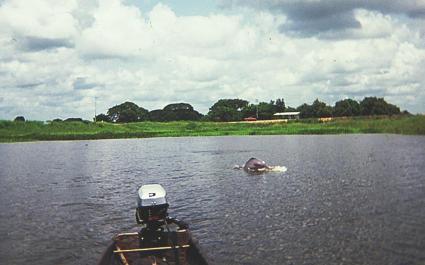
It was a calm day and we were drifting slowly, almost stationary, on a side-arm of the Apurito tributary which had widened across a shallow plain, almost forming a lake. It was a great day for dolphin-watching.
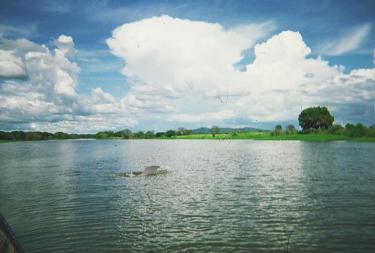
At first we had only spotted one animal, but as we settled down to our observations we soon noticed that we were surounded by a group of five or even more.
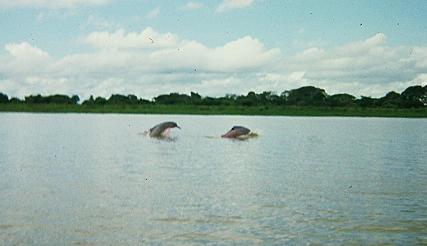
In the murky water, their shapes remained invisible and they seldom extended more than their blow-hole and the uppermost part of their dome-shaped head above water-level, so we could not get a clear idea of how many there were. But I was sure there was at least one calf among them.
Engrossed as we were, with time we relaxed, sipping from our flasks and puffing on cigarettes while keeping an eye on the water.
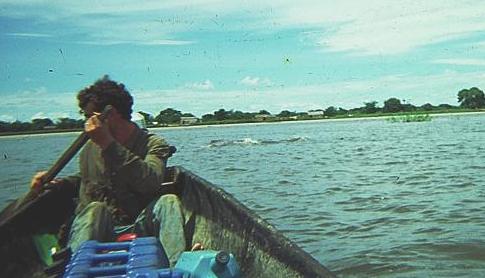
I sat back and dangled one hand lazily over the side of the boat, flipping a butt overboard with the other. A shadowy movement just below the surface — the butt was gone. I pulled my arms up close. We stared at the spot where it had vanished: the water was mirror-calm once again. John dropped his cigarette into the water. The same thing happened. Barely a ripple had broken the surface.
“Piranhas?” he whispered.
We had seen them in the market only the day before. The locals catch them by simply tapping a stick onto the water and hauling them into the boat: fat, silver fish a foot long, covered in tiny scales, their gaping jaws studded with razor-sharp teeth. The dolphins eat them. Maybe that was why there were so many dolphins here.
“Probably,” I whispered back: “Let’s not dangle our hands in the water.”
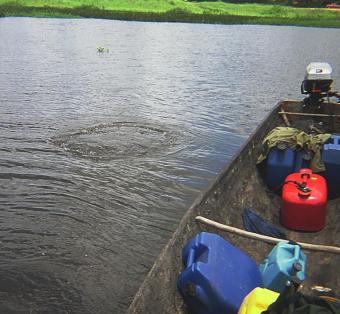
We had gradually drifted closer to shore. That suited us fine, it was about lunchtime. I took the paddle and John steered the boat towards the bank. Chatting, I looked over my shoulder only to see him stare fixedly ahead, noticably paler. His lips formed a word but no sound came out. I turned back and found myself staring into the barrel of a gun.
The guy who trained the weapon on us at point-blank range wore a stetson, a chequered shirt and a miffed expression. No self-respecting bandito dressed like that. As far as we could surmise, he was on his own. He was the ranchero and we were trespassing on his land.
We spoke about three words of Spanish between us, so I doubt he could understand our assurances that we were students studying river dolphins. No matter — we had to try.
“Boto!” John explained.
The guy fixed me for a moment with what I can only describe as an appalled stare before assuming a more menacing frown. I remembered that this is what the dolphins are called in Brazil, but not up here. He could not understand a word of what we were trying to say. Suddenly, I remembered.
“Tonina!” I cried. The guy’s expression relaxed at once.
“Estudiantes”, I went on: “Biologie.” I pointed at my eyes and slowly swept my arms across the river behind us: “Toninas!”
“Ah si.” The man appeared satisfied, but he clearly had us down as crazy. John indicated the boat and ourselves and pointed down the river. The man waved his gun dismissively; we were free to take our leave. This we did, paddling as speedily as the current allowed, all the way back to town.
“Boto” we would learn later that evening, is the local dialect for “hooker”.
